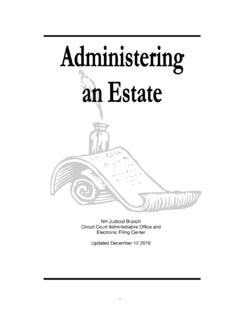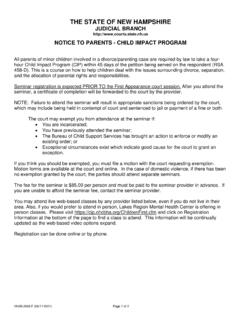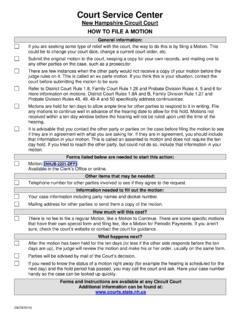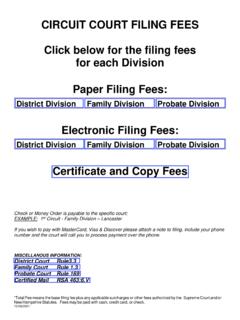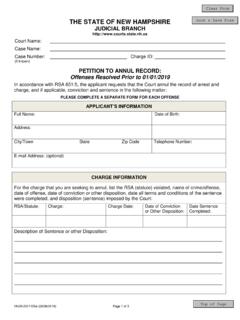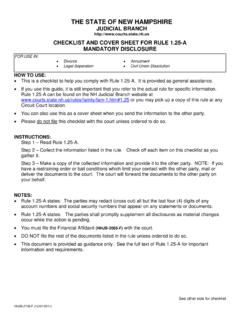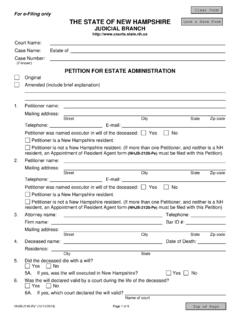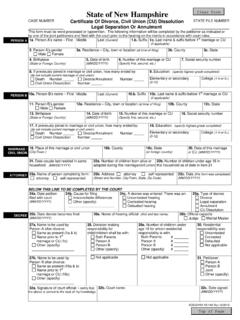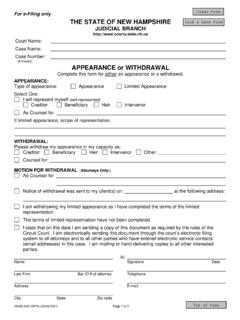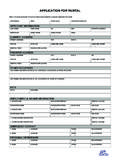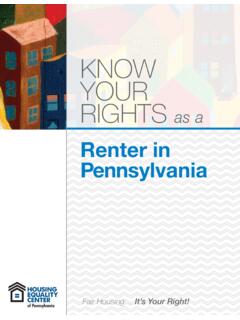Transcription of Court Service Center - New Hampshire Superior Court
1 Court Service Center New Hampshire Circuit Court LANDLORD AND TENANT INFORMATION SHEET. General information: Why do landlords have to go through the Landlord and Tenant Writ process to evict a tenant? The eviction process in New Hampshire is designed to protect the rights of landlords and tenants. The process ensures that tenants are only evicted when allowed under the law and entitles landlords to the assistance of the sheriff in removing tenants who do not have the right to remain in a property. Because the Landlord and Tenant Writ provides a quick, fair process for evictions, landlords are not permitted to use self-help methods, such as changing locks, removing tenants' belongings, cutting off utilities, or threatening or harassing tenants to force tenants to leave a rented property. What kinds of evictions use a Landlord and Tenant Writ? Eviction using a Landlord and Tenant Writ (RSA 540) apply to most, but not all, evictions from residential and non-residential properties, including evictions from manufactured housing parks.
2 Some residential properties, such as hotels, student dorms, shared facilities (RSA 540-B) and vacation rentals (RSA 540-C), do not use the Landlord and Tenant Writ. Review the law at RSA 540:1-a for more information about which properties are excluded from RSA 540. What are the permissible reasons for eviction? The permissible reasons for eviction depend on the type of property involved. For non-restricted properties (all commercial and some residential properties) a landlord may evict a tenant for any reason permitted under the lease agreement that is not illegal ( racial discrimination). For restricted properties (most residential properties) the landlord may only evict the tenant for good cause, as defined by law. Good cause includes: Non-payment of rent. Substantial damage to the premises by tenant or tenant's household or guests. Failure of tenant to comply with a material term of the lease. Behavior adversely affecting health or safety of others. Other good cause. Other good cause for eviction from a restricted property includes, but is not limited to, any legitimate business or economic reason and need not be based on the action or inaction of the tenant, members of his family, or guests.
3 However, the expiration of a lease alone is not good cause for eviction from a restricted property. See RSA 540:1-a and RSA 540:2 for more information. Who may file a Writ? The owner, or an attorney for the owner, of a rental property may file a Landlord and Tenant Writ. The owner may also authorize an employee or person with power of attorney to file the Writ. If someone other than the owner files the Writ, a written authorization from the owner specifically authorizing the person to file against the tenant(s) named in the Writ must be attached to the Writ. The person also must attach a Rule Statement form (NHJB-2804-D) to the Writ. Where to file a Writ? The Writ must be filed in the Circuit Court - District Division with jurisdiction over the town where the landlord or tenant resides or the property is located. If the Writ makes a claim for unpaid rent, it may be governed by the Federal Fair Debt Collection Act (15 1691 et seq.) requiring that the Writ be filed in the jurisdiction where the defendant resides or where the contract was signed.
4 If the Writ is not filed in the Court for the town where the tenant lives, the tenant may request the case be transferred. Transfer is mandatory if the reason for eviction is not non- payment of rent. A motion to transfer must be filed in the Court where the case was originally filed. To find out which Court has jurisdiction over a town, go to What is the difference between a Landlord and Tenant Writ and a Writ of Possession? The Landlord and Tenant Writ is a document notifying the tenant that an eviction case has been filed and giving him or her the opportunity to respond. A Writ of Possession is a Court order which the landlord can take to the sheriff to have served to remove the tenant from the property and change the locks. (01/01/2021). Court Service Center New Hampshire Circuit Court The Eviction Process in New Hampshire Before Court Involvement: Evictions in New Hampshire start with an eviction notice and, if the eviction is based on non-payment of rent, a demand for rent. The eviction notice and demand for rent must be served on the tenant by the landlord (or someone working for the landlord).
5 They may be served in hand or left at the tenant's current residence. Every eviction notice must contain an expiration date. The expiration date serves two purposes. First, if the eviction is based on non-payment of rent, the tenant has until the expiration date to avoid eviction by paying all back rent, plus $15 in damages, to the landlord. Second, in other cases, the expiration date is the date by which a tenant may vacate the premises to avoid an eviction case being filed in Court . After the expiration date, the landlord may go to Court to obtain a Landlord and Tenant Writ, starting the eviction case. It is important to note, however, that an eviction notice is NOT a Court order to leave a rented premises. No tenant may be evicted from a rented premises until the Court orders eviction. The length of notice required before the landlord may seek a Landlord and Tenant Writ depends on the type of property and the reason for the eviction, as shown below: Reason for Eviction Residential Non-Residential Manufactured Housing Non-payment of rent 7 days 7 days 30 days Substantial damage to property 7 days The lesser of the rent period or 3 months 60 days Behavior that adversely affects health or 7 days The lesser of the rent period or 3 months 60 days safety Failure to comply with park rules N/A N/A 60 days Condemnation or change of use of park N/A N/A 18 months Other reasons 30 days The lesser of the rent period or 3 months N/A.
6 An eviction notice which does not provide the correct notice period may result in the dismissal of the eviction action. The Landlord and Tenant Writ After the eviction notice has expired (and if the tenant has not paid back rent in a non-payment of rent case), the landlord may obtain a Landlord and Tenant Writ from the Circuit Court District Division with jurisdiction over the case. Court staff will assign the case a docket number and return the original writ to the landlord for Service . The landlord must arrange for Service on the tenant by the sheriff. The sheriff will serve the tenant, note the Return Day on the writ, and give the writ back to the landlord. The landlord must return the original writ and return of Service to the Court . The Return Day is the deadline for the tenant to inform the Court if the tenant wishes to contest the eviction. The tenant has until the end of the return day to ask the Court for a hearing by filling out an appearance form. The return day is NOT a hearing date.
7 If the tenant fails to file an appearance or appear for the hearing, a notice of default may issue. If the tenant does not respond to the default notice, a writ of possession may issue on the date indicated on the notice. Additionally, if the tenant does not respond and the landlord has made a claim for money damages for back rent, the Court may award the landlord damages up to $1,500. If the landlord is requesting money damages for unpaid rent in the Landlord and Tenant Writ, the tenant may file a claim or counterclaim which offsets or reduces the amount owed to the landlord. The tenant must file the claim or counterclaim on or before the Return Day shown on this Landlord and Tenant Writ. (01/01/2021). Court Service Center New Hampshire Circuit Court Trial in Landlord and Tenant Cases If the tenant requests a hearing, one will be scheduled within approximately 10 days. Both parties must appear at the trial. At trial, each side will have the opportunity to present evidence and arguments to the judge.
8 The burden is on the landlord to prove the elements of the eviction case. The burden is on the tenant to prove any counterclaim or defenses the tenant may have under the law. Agreements The parties can also work out an agreement prior to the trial date. The landlord and tenant may make any agreement about repayment or continuing the tenancy allowed by law. The law also provides for a special category of Court -supervised agreements, sometimes called Pay and Stay agreements, in which a judgment for the landlord is issued but the writ of possession is withheld on the condition that the tenant comply with a payment plan. If the tenant does not comply with the payment plan or stay current on rent, the landlord may file an affidavit of non-compliance with the Court and, in many cases, obtain a writ of possession without further hearing within 5 business days. If the tenant makes all requirement payments, the case is dismissed. The Court provides an Agreement to Stay Writ of Possession (NHJB-2749-D) form that complies with the law, RSA 540:13-c, II, governing such agreements.
9 After Trial and Appeals After trial, the judge will issue a decision for the landlord or tenant. If either side wants to appeal, a notice of intent to appeal the Court 's decision must be filed with the Circuit Court within 7 days after the date of the notice of decision. The appeal must be filed with the New Hampshire Supreme Court within 30 days after the date of the notice of decision, unless a timely motion to reconsider is filed. If the tenant appeals a decision on a non-payment of rent eviction, the tenant must pay one week's rent to the Court when the notice of intent to appeal is filed and must pay rent to the Court on a weekly basis while the appeal is pending. In all other cases, the tenant must pay rent as it comes due. If the judge decides in favor of the landlord and the tenant's appeal rights are exhausted, the Court will issue the landlord a writ of possession. The landlord can then have the sheriff serve the writ of possession and remove the tenant from the property. Questions?
10 If you have questions about eviction cases generally, you should review the Court 's website at If you have questions about your case, such as whether a hearing has been scheduled, you may call the Court at 1-855-212-1234. The law prohibits Court personnel, including the judge, from giving legal advice or counseling to any party. If you have questions you are unable to answer by reviewing this document, the Court 's website, or doing your own research, you may want to consult an attorney. NOTE: legal assistance may be available to you. Go to for more information. Forms All landlord and tenant forms may be obtained in-person at any Circuit Court . All forms except the Writ are also available online at (01/01/2021).
